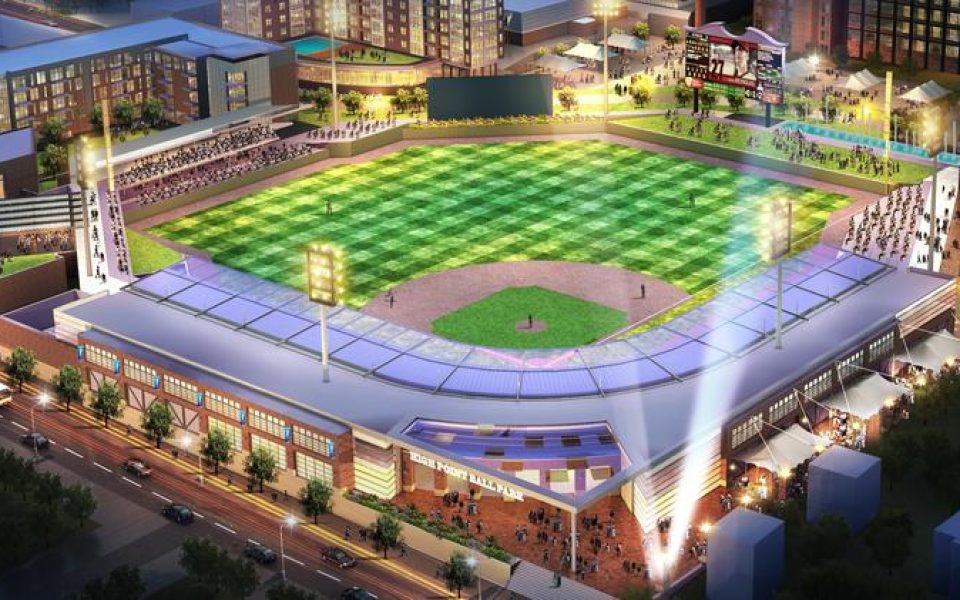High Point city councilmembers, many of whom rode into office on a wave of pro-stadium sentiment, heard updates on the so-called catalyst project from the city manager’s office during a special council meeting on Tuesday.
As construction begins on the multi-use stadium, officials told council members that water, sewer and stormwater lines around the downtown site require significant upgrades this calendar year in order to open the 6.8-acre stadium by the May 2019 target.
“The vast majority of the water and sewer lines in that area were put in the ground in the early 1900s, so not only are they obsolete from an age standpoint, they won’t handle the growth projected in this area,” Deputy City Manager Randy McCaslin said. “The stormwater lines are also undersized…A lot of work being done right now you don’t see. But you will see it in the future.”
The council agreed to a request from staff to hire a contractor to manage infrastructure efforts after design work is finalized. McCaslin said his office can’t provide a cost estimate until the contractor’s assessment, including a “guaranteed not-to-exceed” price for construction. Annually-budgeted money for obsolete line replacement will pay for a portion of the infrastructure upgrades. Last year, city council allotted $50,957,035 for the Water and Sewer Fund Budget for 2017-18, compared to $51,642,201 and $48,798,571 for the 2016-17 and 2015-16 adopted budgets, respectively.
Open bidding for pieces of the project such as concrete and steel is ongoing now that the city’s environmental management plan is approved, but the city manager’s office is fine-tuning operating details related to food service, entertainment and ticketing and other construction minutiae. City staff currently estimates that the stadium will feature 3,400 fixed seats, 1,100 “berm seating” options and plans to include more four-top tables and open areas behind drink rails.
Though primarily intended for use by an Atlantic League of Professional Baseball team, city officials presented several designs plans for transforming the stadium to accommodate soccer, football and lacrosse fields, as well as concerts and other entertainment events. Due to the need for rapid changeover, officials are leaning towards artificial turf.
A soon-to-be rolled out master plan for developing 3.4 acres of non-stadium, city-owned property is also underway. City officials told the council that property in the immediate vicinity of the stadium will limit showrooms and encourage a mixed-use model with a hotel, events center, children’s museum and an apartment complex. Restaurants and retail will occupy the first floors of three- to five-story buildings.
Including the potential purchase of another three acres of downtown property, the city’s total cost for the 10.2 acres either bought or currently under contract is $9.8 million, part of $15 million approved last year by council for the catalyst project. City officials’ conservative estimate of payback on the investment is $115 to $120 million but the developer estimates a return closer to $200 million. The project site contains 268,000 square feet of taxable property.
On Thursday, the city announced the sale of $35 million in limited-obligation bonds to finance the stadium project, including $2.8 million from local investors.
As of Jan. 17, the city of High Point sold $160 million in bonds, including $2.8 million purchased by local investors and $35 million in limited-obligation bonds that will fund stadium construction, specifically. The high volume of orders allowed underwriters to reduce interest rates on maturities, lessening the cost of repayment to be completed by October 2038. The new projected repayment will be $49,742,210, more than $2 million less than the previous projection.
The stadium will occupy the area around Church Avenue and Pine Street. City Manager Greg Demko confirmed that although a network of sidewalk connections is likely in the near future, the planned Southwest Greenway will pass by stadium and further greenway connections are in the works, though years down the line.
Demko said his office plans to call another special meeting to review finer details of a that will spell out all parties’ responsibilities later this month, following close review from a team of attorneys.
Join the First Amendment Society, a membership that goes directly to funding TCB‘s newsroom.
We believe that reporting can save the world.
The TCB First Amendment Society recognizes the vital role of a free, unfettered press with a bundling of local experiences designed to build community, and unique engagements with our newsroom that will help you understand, and shape, local journalism’s critical role in uplifting the people in our cities.
All revenue goes directly into the newsroom as reporters’ salaries and freelance commissions.


Leave a Reply